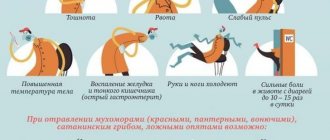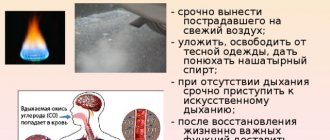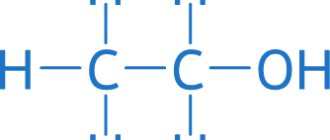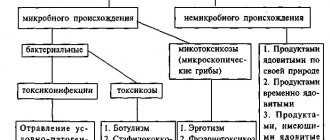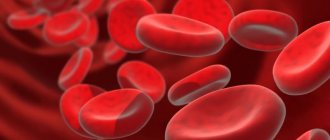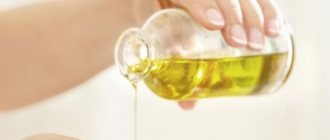Anonymously
Around the clock
Attention! The material contains information about substances, the use of which can cause serious harm to your health!
Drug poisoning is a widespread phenomenon in relevant circles. The main danger is an overdose of toxic substances, which the addict, in pursuit of the next dose, may not keep track of. In second place is, to put it mildly, the low quality of drugs. A cheap surrogate is often a mixture of poisons. Moreover, manufacturers of handicraft products add substances to its composition that are absolutely incompatible with living tissues, for example, washing powder, soda, chalk and others. Lack of timely assistance for drug poisoning can lead to irreversible consequences in the body and death.
- Drug intoxication: what is it?
- Causes of drug intoxication
- Signs of drug poisoning
- Consequences of intoxication for the body
- Types of drug poisoning
- Glue poisoning
- Ketonal poisoning
- Analgesic poisoning
- Clonidine poisoning
- Opium drug poisoning
- Poisoning with psychotropic substances
- Narcotic salt poisoning
- Chronic intoxication
- Acute drug intoxication
- Relieving drug poisoning: advice from a narcologist
- First aid for drug poisoning
- Drug therapy for drug poisoning
- How to relieve drug poisoning at home
- Droppers for drug intoxication
- Drug poisoning pills
- Treatment of drug poisoning in the hospital "Zdravnitsa"
Base
- Narcologist on call 24/7, within 40 minutes
- Consultation with a narcologist
- Dropper 500 ml
- Purpose of therapy
- Tablet course for three days
- Monitoring the patient's condition after the procedure
4,700 RUB
Call a doctor
Standard
- Narcologist on call 24/7, within 40 minutes
- Medical examination
- Consultation with a narcologist
- Dropper 1000 ml
- Purpose of therapy
- Tablet course for three days
- Monitoring the patient's condition after the procedure
5900 RUB
Call a doctor
Intensive
- Narcologist on call 24/7, within 40 minutes
- Medical examination
- Consultation with a narcologist
- Dropper 1500 ml
- Purpose of therapy
- Tablet course for three days
- Monitoring the patient's condition after the procedure
8900 RUB
Call a doctor
Standard
- 6-bed ward
3,000 RUB
Comfort
- 2-bed ward
RUB 5,500
VIP
- 1-bed ward
8,000 RUB
We will select an individual treatment plan
Free consultation 8-800-200-27-23
Drug intoxication: what is it?
Drug intoxication is a pathological condition based on dysfunction of all organ systems. May be acute or chronic. The severity depends on:
- type of drug;
- duration of use;
- dosage;
- composition of the drug;
- the presence of diseases of internal organs.
Symptoms may appear instantly or develop progressively over several hours. Unfortunately, most drug addicts confuse the signs of poisoning with the effect of the drug and do not seek help, which is why death is a common outcome.
Causes of drug intoxication
Among the most common causes of drug poisoning are:
- overdose;
- low quality of the drug;
- simultaneous use of several types of drugs;
- taking the usual dose after a long break or detoxification;
- using a substance during illness;
- human inexperience;
- the presence of unfamiliar toxic additives in the composition.
Of particular danger is mixing the drug with alcohol, as a result of which the effect is enhanced several times.
HOW TO MOTIVATE A DEPENDENT FOR TREATMENT
Signs of drug poisoning
The symptoms of drug poisoning are different and depend on the type of active component. In general terms, the following signs of intoxication can be identified:
- dilated/constricted pupils;
- pale skin;
- decrease/increase in blood pressure;
- increased/decelerated heart rate;
- convulsions;
- lethargy;
- nausea, vomiting;
- respiratory depression;
- disorientation in space;
- hallucinations, delusions;
- loss of consciousness.
The most severe condition develops when the drug is injected into a vein - symptoms appear almost instantly. Drugs taken orally lead to a gradual increase in signs of intoxication.
REHABILITATION
Consequences of intoxication for the body
Drug poisoning does not go away without a trace, even with a successful outcome. An addict may develop complications and consequences such as:
- damage to the heart muscle;
- vascular collapse;
- failure of the liver, kidneys, pancreas;
- congestive pneumonia;
- brain damage;
- decreased intelligence;
- weakening of the immune system.
Damage to internal organs resulting from drug poisoning is irreversible and haunts a person throughout his life, even if he no longer uses drugs.
How to avoid infection
According to the recommendations of Rospotrebnadzor, to prevent botulism you should:
- use only industrially prepared canned food;
- Do not under any circumstances eat canned food with a bulging lid;
- wash vegetables, fruits and mushrooms well from soil particles;
- Do not use vegetable products with signs of spoilage for home canning;
- quickly remove the entrails from caught or purchased fish, wash it well, and then store it in the cold;
- do not preserve, but pickle mushrooms and vegetables;
- Before using as food, boil canned foods for about half an hour to destroy botulinum toxin.
You should know that products contaminated with Clostridium botulinum are indistinguishable from quality food in taste, color and smell. The best way to avoid poisoning is to heat treat any canned food for 15-20 minutes. This will help avoid not only botulism, but also other intestinal infections that cause poisoning and inflammation of the gastrointestinal tract.
Types of drug poisoning
Depending on the type of drug and clinical manifestations, intoxication can be of different types.
Glue poisoning
Intoxication due to inhalation of toxic vapors is manifested by symptoms such as:
- respiratory depression;
- heartache;
- hallucinations;
- convulsions;
- bluish skin tone.
The addict becomes aggressive and irritable. Overdose leads to fainting and coma.
Ketonal poisoning
Ketonal is a non-steroidal anti-inflammatory drug that is prescribed for severe pain and inflammatory processes, mainly in the tissues of the musculoskeletal system. The active ingredient is ketoprofen. Poisoning with the drug leads to severe central nervous system disorders: hallucinations, psychoses, nightmares, disorientation in space, speech disorders.
Analgesic poisoning
Some analgesics, for example, Ketanov, have side effects in the form of: swelling of the skin and lungs, hallucinations, visual and hearing impairment, psychosis, depression. Taking a large dose of the drug leads to poisoning, increased side effects, and can cause respiratory arrest, convulsions, loss of consciousness, coma, and even death.
Clonidine poisoning
The medicine Clonidine is intended to lower blood pressure. An overdose leads to severe poisoning, which is manifested by symptoms such as:
- heart rhythm disturbance;
- a sharp decrease in blood pressure;
- decreased body temperature;
- constriction of the pupils;
- pallor;
- weakness;
- coma.
Uncontrolled use ultimately leads to the death of the drug addict.
Opium drug poisoning
Opium drugs are highly toxic, so their use often leads to death. The following signs are characteristic of drug poisoning with morphine or other opiates:
- decrease in heart rate;
- disturbance of consciousness;
- bluish skin;
- narrow pupils;
- incomprehensible speech;
- paralysis of limbs;
- breathing disorder.
In the absence of medical care, intoxication with morphine and other opiate drugs leads to pulmonary and cerebral edema and death.
Poisoning with psychotropic substances
Substances of this group affect the cells of the nervous system, as a result of which the mental state of the drug addict changes. They can be stimulants of the central nervous system (amphetamine, cocaine) or, on the contrary, cause its depression (sedatives, for example, Diphenhydramine), so the symptoms of drug poisoning vary. In general, the following signs of overdose of psychostimulants and sedatives can be noted:
- panic attacks, anxiety;
- tremor, cramps of the arms and legs;
- a state of numbness or, conversely, excessive activity;
- heart rate decreases or increases;
- pain in the heart;
- frequent or rare breathing;
- loss of consciousness;
- severe pain in the head.
Intoxication with psychotropic substances especially severely undermines the condition of the heart and brain. An overdose can cause a heart attack. And even if assistance is provided in a timely manner, the neurons of the central nervous system will not recover, which will further affect mental abilities and psyche.
DETOXIFICATION FOR DRUG ADDICTION
Narcotic salt poisoning
Salts are hallucinogens and are considered one of the most dangerous types of drugs. They cause severe addiction and severe withdrawal symptoms. Salt poisoning can quickly lead to death for a drug addict. Among the symptoms:
- a sharp increase in blood pressure;
- severe vomiting;
- convulsions;
- hemorrhages in the eyes;
- high heart rate;
- hallucinations;
- loss of consciousness, coma.
Salt intoxication requires the rapid arrival of specialists, as minutes often count.
TREATMENT OF SALT DEPENDENCE
Chronic intoxication
Chronic drug poisoning is the gradual accumulation of toxic substances in tissues as drugs are consumed. Over time, the poisons deposited in the organs completely destroy the body. In this case we are talking about the length of service.
REMOVAL AT HOME
Acute drug intoxication
Unlike the chronic form, acute drug poisoning occurs immediately, for example, as a result of an overdose.
Why does poisoning occur?
Some suicidal people may deliberately take large amounts of medication to kill themselves. Sometimes patients do not know the permissible dose of a drug that can be taken once or throughout the day, and sometimes they do not understand that they are drinking the same substance under different brands (this applies, for example, to antipyretics based on paracetamol).
Content:
- Why does poisoning occur?
- Main symptoms of drug poisoning
- First aid
- Preventive actions
Also, drug poisoning can occur when its use is combined with other medications or substances, the combined use of which causes intoxication. You should not abuse tranquilizers and antidepressants, since their excessive amounts inhibit the activity of the nervous system, heart medications, and painkillers.
Poisoning can also occur due to absent-mindedness, when older people forget whether they have already taken a pill or not, and double the dose. The same thing happens in cases with young children who show interest in everything new and unusual, and parents leave drugs in the public area, which encourages kids to try pills.
A common cause of drug poisoning is self-medication, when, without consulting a doctor, a person starts taking the wrong drug, or the drug in the wrong dosage. This leads to a worsening of the disease, exacerbation of other internal diseases that the person did not take into account when he started taking the drug.
There are cases of allergic reactions to medications, as well as deliberate attempts to poison someone using medications. In everyday life, you must try to take into account all the above factors as much as possible so that taking medications does not lead to serious consequences.
Relieving drug poisoning: advice from a narcologist
Is there a way out of drug intoxication? Below are recommendations from our clinic’s narcologists.
First aid for drug poisoning
- First of all, if you have symptoms of drug poisoning, you should call an ambulance. It is best if this is a specialized drug treatment team. Specialists have with them all the medications necessary in such cases.
- The drug addict should be placed on his side; if convulsions are observed, a rolled-up cloth should be placed between the teeth.
- If there are signs of cardiac arrest, chest compressions and artificial respiration should be performed.
- If a drug addict loses consciousness or falls asleep, cotton wool soaked in ammonia is brought to the nose.
- In a state of overexcitation, a person needs to be calmed, restrained, and, if necessary, even tied up, since at the moment of exacerbation of psychosis and hallucinations, he poses a danger to himself and others.
Find out treatment recommendations without leaving home for free
To select a treatment plan, you just need to leave a request, we will contact you to select the time and specialist you need
Submit your application
Drug therapy for drug poisoning
Specialists who arrive on call will administer drug therapy based on the characteristics of the case. Medicines are selected strictly in accordance with the substance used, which was the cause of poisoning. If there is an antidote to it, the doctor will immediately use it.
DRUG THERAPY FOR DRUG ADDICTION
How to relieve drug poisoning at home
In case of drug poisoning, you should not give any medicine to a person! The reaction may be unpredictable and lead to rapid death. If the drug addict is conscious, it is allowed to take sorbents, for example, activated carbon. Only a professional narcologist knows how to reduce the severity of symptoms of drug intoxication.
DRUG CARE AT HOME
Droppers for drug intoxication
The first thing the doctor will do is to ensure detoxification of the body. It can be carried out at home in the form of a dropper or in a hospital (ultra-fast detoxification, laser and other options). The goal is to quickly neutralize and remove toxic substances from the body. The composition of the dropper is selected individually. It may include: diuretics that support the liver and heart, sleeping pills, and so on.
DROPPER AT HOME
Drug poisoning pills
In case of drug poisoning, a specialist may prescribe pills such as:
- sorbents, for example, activated carbon;
- medications to stop vomiting;
- vitamin and mineral complexes.
In addition to those listed for alcohol intoxication, the narcologist will prescribe symptomatic drugs: anti-inflammatory, analgesics, anticonvulsants, sedatives or others.
Treatment prices:
| Service | Price, rub) |
| Types of therapies | |
| Standard detoxification therapy | 3 500 ₽ |
| Double Detox Therapy | 6 000 ₽ |
| Enhanced Detoxification Therapy | 7 500 ₽ |
| Maximum detoxification therapy | 9 500 ₽ |
| Quick sobering up at home | 7 500 ₽ |
| Hospital at home 1 day | 22 000 ₽ |
| Advanced hospitalization | 15 000 ₽ |
| Treatment in hospital | |
| Accommodation | |
| Economy chamber (6 beds) | 2 000 ₽ |
| Standard room (4 beds) | 3 000 ₽ |
| Increased comfort (2 seater) | 5 500 ₽ |
| VIP chamber (1 person) | 12 500 ₽ |
| Individual post 24/7 | 5 000 ₽ |
| Medical and social rehabilitation 21 days | 140 000 ₽ |
| Service | Price, rub) |
| Initial consultation with a narcologist | for free |
| Consultation with a psychologist | 3 000 ₽ |
| Psychiatrist consultation | 5 000 ₽ |
| Coding at home Torpedo | 7 500 ₽ |
| Express output and encoding (doublet) | 13 500 ₽ |
| Coding using the Dovzhenko method | 12 000 ₽ |
| Hypnosis classic session | 13 000 ₽ |
| Ericksonian hypnosis session (NLP) | 8 000 ₽ |
| Coding method Torpedo | 5 500 ₽ |
| Double block | 8 000 ₽ |
| Esperal injection for 1 year | 9 900 ₽ |
| Tetlong for 3 months | 10 500 ₽ |
| Esperal gel for 1 year | 15 000 ₽ |
| Selincro course of therapy | 12 500 ₽ |
| Implantation of Disulfiram for 1 year | 18 000 ₽ |
| Vivitrol injection for 1 month | 26 000 ₽ |
| Naltrexone stitching for 3 months | 35 000 ₽ |
| Neuroimplantation Prodetoxon for 6 months | 47 500 ₽ |
| Narcopsychotherapy session | 50 000 ₽ |
| Neutralization of encoding | specify |
| Psychodiagnostics / pathological diagnostics | 7 500 ₽ |
| Psychotherapy session | 5 000 ₽ |
| Family psychotherapy | 6 000 ₽ |
| Outpatient rehabilitation in Moscow | 33 000 ₽ |
Expand
If necessary, the drug addict will undergo such measures as: incubation, catheterization, resuscitation, and so on.
All the efforts of our specialists are aimed at saving people from drug death.
Article verified by an expert
Terekhova Anna Vladimirovna
psychologist-consultant on socio-psychological work with addicted clients and their families. More than 10 years of experience.
Similar articles:
Alcoholism and drug addiction. Resistance to treatment
Alpha PVP: consequences of use
How to help a loved one with a salt overdose?
How fears strengthen codependency
How to quit smoking spice yourself?
One comment on “Drug poisoning: first aid”
- Karina:
June 21, 2021 at 03:53
First aid for poisoning by any substance that has entered the body through the mouth is to rinse the stomach and intestines and take adsorbents that accelerate the removal of toxins from the body.
Answer

